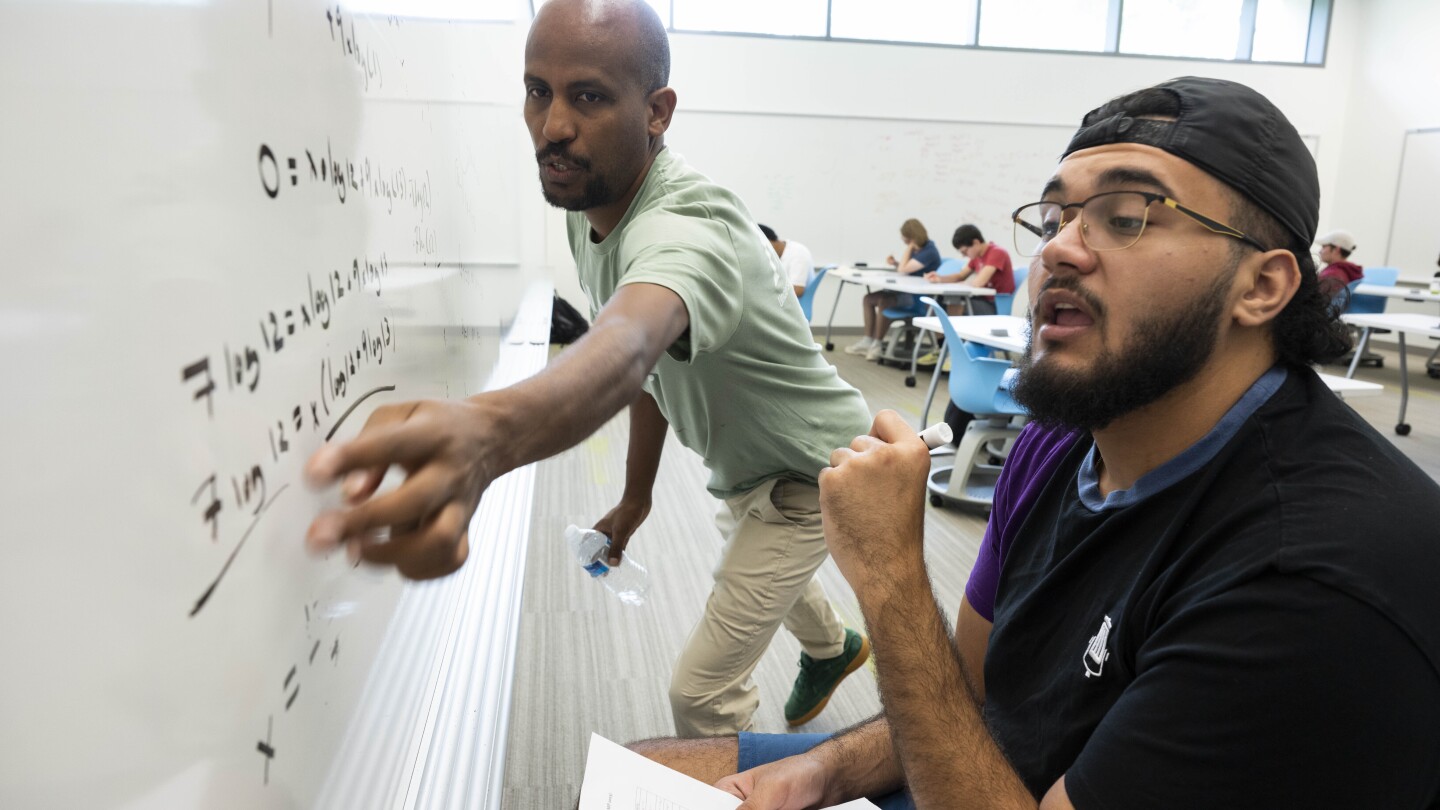Colleges across the country are grappling with the same problem as academic setbacks from the pandemic follow students to campus. At many universities, engineering and biology majors are struggling to grasp fractions and exponents. More students are being placed into pre-college math, starting a semester or more behind for their majors, even if they get credit for the lower-level classes.
Colleges largely blame the disruptions of the pandemic, which had an outsize impact on math. Reading scores on the national test known as NAEP plummeted, but math scores fell further, by margins not seen in decades of testing. Other studies find that recovery has been slow.
HS math teacher here. A lot of these problems existed prior to the pandemic. Parents making excuses for kids. Teachers making excuses for kids to keep parents and admin off their backs. Kids too reliant on calculators to develop “number-sense”. Parents perpetuating the myth of the “math gene” they don’t have because they failed at the "new math " of the 1970s, etc. The list goes on and on. The whole thing where ELA/Social Studies/History/etc. teachers are struggling with AI like ChatGPT? We went through that when Photomath and the like were released. The shortcuts you take in math WILL catch up with you.
That being said, maturity plays a HUGE part. A dedicated math student will struggle, but won’t take shortcuts. They are better for it. The only thing that has changed is that shortcuts are much easier to take and are much more readily available. I cannot count how many shortcuts I took as a teenager, only to realize later that I F$#@! up long-term with my learning journey. Just look at any community college. Students that were “bad at math” suddenly have the realization that if they put in the effort, then the intellectual and/or GPA dividends will pay off in spades.
deleted by creator
All true, but there also exist a ton of shitty math teachers who fail to connect with students or give a shit. I struggled all through college and eventually learned it was because of a combination of books and teachers skipping critical steps, and some professors using slightly different math language than I was previously taught, so I thought these were new things but it was just a new termnjnterchangeable with stuff I’d previously done. Especially in various algebra and calculus.
You can’t expect some kids to learn and “show their work” if there’s actually 10 steps to a problem but you consistently skip 5 of em assuming they just get it. Too many just assume we learned something in prior grades that we actually didnt.
The real issue is that they are teaching arithmetic as though it is just playing with numbers, rather than that it is the alphabet of an entirely different language that is far more precise than any human language ever could be. I don’t know how to fix that because it didn’t click for me until Calculus, but that is a root issue, and why there are so many bad math teachers. Admittedly it’s very dry material, and I don’t know how to get kids excited about math, unless you incorporate it into baking lessons. They all love cookies and cake.
I’m a firm believer that a not insignificant portion of people had one or two really shit math teachers at some point, decided that they’re bad at math because of it, and then proceeded to just give up. Very often it was specifically related to fractions.
The math professors at my uni were fantastic, and I saw many friends who always thought they were bad at math have lightbulb moments where something finally clicks.
So, like personally, all of my math teachers taught math as a goal in itself. Which is incredibly un-interesting. It’s taught like a chore.
Which is an incredible disservice.
Yes. I liked algebra initially, I hated geometry, I loved trigonometry initially, and through college the only math I fell in love with was linear algebra
Apparently, it was because I was taught “this is for optimization. Look at how you can balance cost, performance, and reliability to find the optimal network hardware based on your needs”. It was like magic, it took a problem I thought would be unsolvable and have no definite answer, and a few hand waves later there you do
It wasn’t until a few years ago that I realized oh, I actually really like math. I just need a reason to want learn it
I can completely understand that perspective. However, some students are just not mature enough to handle every type of math thrown at them when it is. One “bad” teacher can ruin any subject. Some students just aren’t “ready” when the curriculum (or other powers that be) decides that they should be.
Most subjects also don’t build off of the last class anywhere near to the same degree as math. You have a shitty teacher in geography, that’s not really going to be putting you at anywhere near as much of a disadvantage when you take world history.
The maybe rheu shouldn’t advance and be failed? Like to me if you’re bad at a subject, you should be required to take it until you pass it, not push along to the next harder version of it. Kids don’t get left back or failed now. That is the problem. If you’re not ready fine, but you can’t take algebra until you pass pre-algebra.
I’m speaking as someone who didn’t learn to read until 3 grade and still graduated on time and went to a good college. Failing classes is fine as long as you can also catch up if you rapidly learn the material as well.
The maybe rheu shouldn’t advance and be failed
Most people can fake their way enough to pass the test without having a true understanding of the concepts behind it.
Yeah, but math isn’t really relevant for most people past the elementary school level.
It’d be pretty messed up to fail them for something they aren’t going to use in the real world. Lots of people who justifiably ‘don’t care about math’ would be held back for no good reason, except maybe to stroke the ego of people who do.
I hate these takes. Math isn’t about relevance of specific concepts and whether you’ll use them in day to day life. It’s about learning to think critically and problem solve in general. We need more of society to be better at that.
Being good at solving lots of complex math you never use in every day life CAN be beneficial in nearly all situations which require critical thinking, problem solving, logic, following instructions, etc.
There’s a weird amount of accepted anti intellectualism that specifically applied to math, and I’ve never understood it.
Most people have a hard time grasping concepts as simple as compounding interests, which is an incredibly important concept if you want to either save money or not go into ridiculous amounts of credit card debt. You use algebra every single day, doing thing as simple as shopping. People just don’t realize it.
You have a good point, but it’s not something most people would be interested and for good reason.
They need pragmatic ways to care about the problem at hand. If you can’t offer them that, you’re just focusing on theory which may or may not be relevant. Lo’ and behold, people care more about what’s actually relevant than what may be relevant.
It’s about learning to think critically and problem solve in general.
To be fair, that’s not specific to mathematics at all.
You have a good point, but it’s not something most people would be interested and for good reason.
We’re talking about children here. People who would let their teeth rot away if no one constantly fussed at them about brushing. People who don’t understand why they shouldn’t do a great many things that will actually kill them.
We don’t actually care about what children want to learn. This article is talking about math that is taught before puberty. That’s the math that people are struggling with. That’s everyday math. We’re not talking about calculus here.
You’re saying that there’s no pragmatic way to teach things, but really that’s not the problem of children and you know it. Kids get word problems and whatnot to tell them how math can be relevant, but just like English and history and basically all of school, they don’t want to do it. Math is weird because it actually builds on itself and you need to understand every part. It’s not something where if you forgot or never learned you can bullshit your way through.
I’m speaking as someone who went to a top engineering college and my English 101 class had to check for literacy. I was the literal only student out of like 20 who got to skip the exam. Several of my peers were functionally illiterate from reading their essays and whatnot.
It’s not just math. It’s everything and it’s the failure of the system that we do not fail children when they don’t achieve. If they don’t like it they can drop out at 16 get a GED or be known as the uneducated people they are.
I guarantee you that if we went back to failing kids they’d learn more. My sister failed a whole grade and the embarrassment from it and the pressure from my parents was a fantastic motivator.
deleted by creator
Do you ever think a lot of people just don’t care about math because it isn’t relevant to their every day lives?
Math is kind of this thing that we patronizingly tell children is so important and force them to learn. Many of them then go home and realize math, unlike reading, doesn’t actually matter for most people past the elementary school level. It really doesn’t.
Except it does, which is why so many people are so bad with money.
I could agree with criticisms of outdated teaching methodologies or uninteresting course material, but saying math is irrelevant is totally misguided.
I said past the elementary level.
Even understanding things like compound interest don’t require you to be able to do the computation itself.
Being bad with money is a complicated subject. It goes way beyond an understanding of math, hence why there are plenty of people who are good at arithmetic but still spend like idiots.
That’s fair, on the second point, but I can only partially agree with the other.
There’s no “shortcut” to real learning (i.e. developing an intuition, understanding, etc) besides practice, the closest maybe being cleverly developing new ways to teach.
We definitely don’t need to teach those old mental math tricks anymore, but brains learn via practice (i.e. manual computation) to gain the fundamental understanding needed before using tools to skip those steps.
The only way I can imagine really not needing for normal life is if you can afford to pay someone you trust to understand it for you.
The only way I can imagine really not needing for normal life is if you can afford to pay someone you trust to understand it for you.
Again, beyond the elementary school level. So, how do all the poor people without higher level math skills survive?
You’re being very patronizing right now. Probably because you, personally, rely a lot of math skills that the vast majority of people somehow manage to do without.
I hope you can realize that.
It does though, understanding what interest is and how it works is pretty relevant. Understanding percentages and fractions is important for things like cooking too. Ever tried to build something without using any math? It’s everywhere, it literally describes our world in a language that allows us to predict things as well.
you have a recipe that serves 5. You only need to cook for two. That’s a fraction right there
Yeah. The vast majority of amateurs who build things don’t use advanced math. Most people don’t build anything significant at all, and that’s okay.
I get it. If you’re looking for a career that requires math, great. Learn it. Most people aren’t and don’t need it.
Math people just don’t understand this. Or they do and they don’t want to admit it.
Whatever makes them think what they learned is better than what other people learned, I guess.
And here we find the poor problem solvers in life who lack critical thinking skills.
Nice personal attack. Did you make it just cause you have no real argument?
Problem solving and critical thinking are skills developed by math education
Right. They’re also developed by many other things.
Math isn’t a requirement to develop those skills, lol.
Why is this so difficult for you to understand? I’m thinking you must be trolling at this point.
I was told by one of my kids teachers that teaching my second grader to carry the one was wrong.
Also they were basically doing algebra in the beginnging just not using letters. Ie: 1 + __ = 9 , fill in the blank. So I taught my kids to just put x in the blank part and solve for x. Teacher said I was teaching them bad habits.
I am still flabbergasted. My kid is not a math wiz to this day, but I’m pretty sure the strategies im teaching them are the only things getting them by. I’ve taken to teaching them dice games like 10,000/Farkle and making them keep score.
I still continue to cheat/take shortcuts because I need to ensure I pass because if I don’t, I wasted thousands of dollars. If I had the luxury of actually learning rather than performing well on tests, I could have been a better student.
Long-term, shortcuts will still hamper learning. However, there is still a lot to be said about the over-reliance on testing in education in general. It, unfortunately, is a system that even educators must operate in without any real input. You likely will be surprised what you can do with a little guidance in a self-paced situation. What was that Mark Twain quote here - “Don’t let your schooling interfere with your education.”
That’s not really your fault but i hope you’ve planned what the long term means for you. We live in a society that expects higher education for any meaningful kind of occupation but simultaneously gate keeps it and pressures kids into lifetimes work of debt to keep forcing them through the system.
I struggled with any math basically beyond fifth grade. It was incredibly hard for me. Math continued to build on the previous year until I worked my ass off to get C’s. Every year after that I got C’s all while spending hours and hours studying the homework and equations and doing problem after problem. I was in remedial math at community college. The only reason I passed college algebra was because the homework was online and I was able to do every problem over and over again until I got it right. That was 14% of my grade and got me up to a C.
Some people don’t get the support they need. In a subject like math that is detrimental.
Fractions and decimals. There it is. You never learned how to read .125 as 1/8 and vice versa. This is the most common thing in the US, maybe elsewhere. If you don’t really understand that, then Algebra and Calculus may as well be Greek to you.
What benefit is there to rote memorization of common fractions in this day and age, though? We all have calculators in our pocket and most often, real world problems aren’t going to come out to neat fractions like 1/8 or 1/4. I think the time spent on forcing kids to memorize a table of decimals/fractions could be better used elsewhere.
There’s no benefit to rote memorization. Understand how to fluidly convert between the two is necessary to understand algebra that your pocket calculator can’t just spit the answers out for you. Also for some reason calculators don’t do order of operations correctly, so it’s useful to know how the language works, not memorizing by rote.
Parents perpetuating the myth of the “math gene” they don’t have because they failed at the "new math " of the 1970s, etc.
This is a huge reason why I’ve never been able to help my daughter with her math homework. I learned to do things a totally different way from the way they teach now.
I recognize the way they do math now as very similar to how I do it in my head. I still couldn’t help my niece. The rules were so fucky to me.
You can say “fuck” here, it’s ok.
Are they sure it’s pandemic? And not just a new product of the good ‘ol American education system?
I tutor college students. While many students struggled with math before the pandemic, the fallout from the changes made during the pandemic made these deficiencies so much worse.
deleted by creator
It could be but the reality is that the educational system by and large bungled the transition from in person to online classes. The quality of education during that time was severely compromised.
How are they getting into college? I guess colleges are accepting lower standards to keep money flowing?
Otherwise wouldn’t the students just do terribly on the math section of the SAT/ACT and just be denied entry?
Sounds like that is what accredited Universities should be required to do if so. If you haven’t learned the prerequisites there is no reason to be acting like they should be there.
As for math, something that Ive noticed over and over again is that if students are explicitly told to solve a specific math problem eg. 145 × 306 = ? they can generally do that but if you give them a problem that requires them to know when to multiply, divide, add, subtract etc. they struggle. They also struggle in finding systems that are analogous to one another and use the same math. eg. limiting reagents and cooking. i.e what do you run out of first? how much stuff can be made given what you have? They can do that for things theyre familiar with but they cant do the exact same type of problem with molecules instead of say… apples and oranges. That kind of weakness wont be caught in their grades or SAT/ACT problems unless they rely heavily on those type of problems which they dont. And its also something that is harder to teach and easier to fall through the cracks during a pandemic.
AND on top of that, online classes are harder to control the use of resources that they shouldnt be using and was arguably not as well prepped and planned for. Teachers simply were not prepared to teach remotely and in some cases eg. labs, you cant really effectively teach the same thing remotely as in person.
Is this what you mean they couldn’t answer? Or are you saying would just be hard to submit answers online?
Denote the methods used and how many of each item can be made in the following baking situations:
Ed has: 4 dozen eggs (thank god prices came down some so he didnt get robbed), 5lbs of sugar, 12lbs of flour, and 5 gallons water.
Item 1 requires: 2 eggs 1lb sugar 2lbs flour
Item 2 requires: 1 egg, 4oz sugar, 300oz flour
Item 3 requires: 500ml water, 250g sugar, 350g flour
The situations I am talking about are things like: “You have 6 pounds of flour, 6 pounds of sugar and 12 eggs. Each cake requires 2 pounds of flour, 4 eggs and 1 pound of sugar to make. How many cakes can be made? What ingredient if any, is left over? How much of that ingredient is left over if any?”
Or being able to work in units of pounds but not grams. They struggle with generalizing what they know. i.e its brittle knowledge. They know how to press buttons but not why
Gotcha, that was my intent of making item 1 easy without conversions. Then 2 conversions, then 3 conversions to metric. Thanks for spending the time to type that out for me. It helps me get a better grasp of it. : ) Hope you have a great day
deleted by creator
deleted by creator
The question isn’t if fractions are taught. The question is why aren’t people retaining it while they are there.
I tutored math for a number of people. One of my pupils was a real problem case. He was attending a kind of specialized high school equivalent in my country, basically a vocational training plus ability to attend university later with a subject close to his training. This guy wanted to go into chemistry. If there is one area in STEM where you need fractions day in and day out, it’s chemistry. And this guy had serious problems grasping the very concept of it. Having problems with fractions + chemistry is a dangerous and possible explosive mix. Luckily for humanity, he later went into a different branch of jobs.
And this guy had serious problems grasping the very concept of it.
It’s literally just division. Like, even if you add variables, it’s still just division.
Fractions and decimals are where the vast majority of Americans start having trouble with math. I don’t remember learning them, but as a student teacher I did notice that the textbooks circa 2000 were teaching decimals and fractions weird. Unfortunately math is one of those things that if you don’t understand one part, you won’t get the rest cause it builds on itself. I left teaching before I even graduated college, for many reasons that have nothing to do with teaching, so I don’t know how to fix the issue. I’m just aware of it, so anyone in my adult life that complains that they just “aren’t good at math,” I will suggest that fractions and decimals are what they don’t understand, and 90% of the time they agree with me, and realize that they don’t actually suck at math.
deleted by creator
deleted by creator
I took the SAT the first year they had calculators and no one told me, but I was still able to do enough in my head and on paper to get an okay score. I probably would have gotten a higher score if I could have checked my work with a calculator, but I doubt kids today would even be able to do what I did.
deleted by creator
They’re blaming the pandemic which caused lockdowns for a couple of years for college students struggling with fractions and exponents? This is math that is supposed to be learned before high school. I don’t think the pandemic is to blame for this.
I don’t think the pandemic is to blame for this.
It’s not. It has been a problem for years.
Yeah… I started college back in 2013 and had a roommate that didn’t know order of operations…
I think we’re failing trying to focus too much on quantity over quality. There were tricks I didn’t learn until college that someone should’ve taught me years ago. Things my parents learned that stayed with them for decades nobody ever bothered to tell me, and occasionally either they or someone from their generation would just say something like “9 * something adds up to 9 (e.g.
9 * 5 = 45,4 + 5 = 9)”, “move the decimal place and multiply by two to calculate the tip”, “i before e except after c.”But nope, didn’t learn that, instead I “learned” 3 different ways to do the same thing for solving various algebra situations and at 28 remember none of them. I feel very sorry for the common core kids, I expect them to retain even less with common core’s embrace of this approach. Teaching people multiple ways to do something is great, but ultimately the teacher is going to use one, and they’re going to move too fast for you to translate “their way” into “your way” (at least that was my experience in high school math when I tried to do it a way different than what the teacher was teaching).
The pandemic made everything worse, but students struggled with math as long as I have been alive. As someone who loved science and math stuff outside school, but hated it with a passion in school, this text really put my thoughts into words as to why :
Lockhart’s Lament: https://maa.org/sites/default/files/pdf/devlin/LockhartsLament.pdf
TLDR: It is taught wrong.
As a dad constantly frustrated with the shittiness of my kids’ math curriculum: thanks, this is wonderful, puts to words a lot of what I’ve been feeling and more.
I love this lament.
Also an entire education system that does its best to be bad at making math interesting.
Yep. I’ve always been bad at math, I still am, but at least college math was interesting even though I didn’t get it very well.
Go back and really understand fraction and decimal conversion. I’ll bet if you do that, the higher levels will make a lot more sense. That’s where most people get lost.
It also helps to understand that math isn’t just moving numbers around. There’s a lot of that going on, but it is essentially a language that at the higher levels can be used to describe anything, even stuff we haven’t bothered inventing yet. Boole died “knowing” he invented a branch of mathematics that would never have any practical applications in the real world. We based all of computer science on it.
the pandemic was three years ago. If these people are getting into college now, they had to have learned that stuff prior to the pandemic
The hardest maths are usually in their junior or senior year in high school. It’s reasonable to believe that if they weren’t challenged to make the connections it didn’t stick. Just because they learned the fundamentals doesn’t mean they went and manipulated them in the manner they need to be familiar with for higher learning.
But it says they are struggling with fractions and exponents, don’t those get taught earlier on?
The don’t say how they are struggling. It could be inside more complex equations. Or conversions.
deleted by creator
I struggled with certain math concepts that I should have learned in high school because my school district had low expectations and failed to prepare me for college math. I also was unprepared for grad school math because undergrad failed to prepare me cause it was so dumbed down. This has been a fundamental issue for a long time. All of this was over a decade ago.
They’re called weedout classes, and they’re designed to be hard.
Don’t these colleges have any admissions standards? What’s going on that they’re admitting these idiots?
deleted by creator
Well it turns out that the SAT and College Admissions/grades are all on a curve. Hell, even real life is relatively on a curve.
So, Idiocracy was a prescient documentary.
I kind of feel bad for thinking this way, but regardless of whose fault it is, if you don’t understand fractions you should not be pursuing a STEM degree.
What constitutes ‘understanding fractions’ in your mind?
Not “struggling to grasp” them, as the article (or at least the summary) phrases it.
My kids learned these in 6th and 7th grade. But sure, it wasn’t the classes 6-7 years before college, it was only the ones 2-3 years ago…
Yeah the timing doesn’t work out for this to be pandemic related. These students would have been struggling with basic math in the middle of high school before the pandemic even started.
I took a semester off math in college and it was a huge mistake, the year off most kids had resulted in a huge backslide. It’s also important to remember that even pre pandemic the majority of kids weren’t competent in math to start with.
Math was a big issue for me, and all the colleges in CA were shutting down any math classes lower than college algebra. I barely made it into the beginning and intermediate algebra classes before they shut them down.
What they do now if funnel all the students who don’t test into college algebra into “college math topics” which is an array of real-life mathematics that you’d come scross, like voting types and loans/interest rates. Which is a good thing to have as a class, but wouldn’t have helped me get my degree in drafting.
It’s a real good thing khan academy exsists.
“It’s not just that they’re unprepared, they’re almost damaged,” said Brian Rider, Temple’s math chair. “I hate to use that term, but they’re so behind.”
It’s as if there was a highly-infectious pandemic that’s known to damage most organs of the body, including the brain
Or maybe the scientists and doctors that said shutting down schools was terrible for development, were actually on to something.
That doesn’t track. Only thing school did was make us spend less time sleeping. Pandemic shutdown was actually a blessing for many overworked people.
And it was awful for students who basically weren’t taught for a year. We are now seeing the results of those policies in lower test scores and competency in basically every subject. This was entirely predicted by people who care about child development.
Yeah, let’s have more dead people. That would be better than kids having a worse schooling experience for a year. Absolutely.
sports and factories ain’t need no math by god! USA! we got to the moon first everyone else gets our sloppy seconds MURICA! Jesus didn’t heal with fractions
living in the us is like watching Rome burning albeit slowly
















